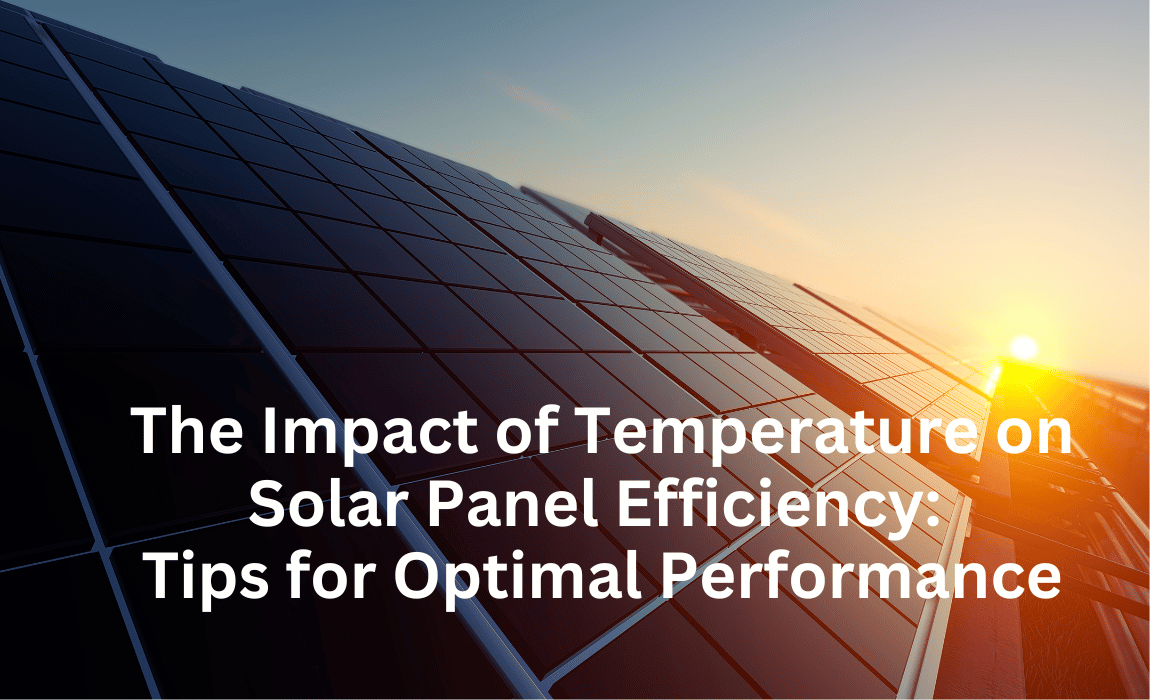PV solar panels are a popular and sustainable solution for generating electricity from the sun’s energy. However, temperature plays a significant role in the efficiency and performance of solar panels. In this article, we will explore the impact of temperature on solar panel efficiency and provide tips for optimizing their performance in varying temperature conditions.
Understanding the Temperature Coefficient
The temperature coefficient is a crucial factor in determining how temperature affects solar panel efficiency. It represents the percentage decrease in panel efficiency for every degree Celsius increase in temperature. Solar panels typically have a negative temperature coefficient, meaning that as the temperature rises, their efficiency decreases.
The Effect of High Temperatures on Solar Panel Performance
High temperatures can lead to a decrease in solar panel efficiency. When the temperature rises, the electrons in the solar cells gain more energy, causing increased resistance and a reduction in current flow. This phenomenon is known as the thermal effect or thermal losses. Consequently, the overall power output of the solar panels is reduced.
Factors Influencing Solar Panel Temperature
Several factors contribute to the temperature of solar panels, including ambient temperature, solar radiation, and panel orientation. Ambient temperature refers to the temperature of the surrounding environment, which can vary with climatic conditions and seasons. Solar radiation, or the intensity of sunlight, also affects the panel temperature. Additionally, the tilt and orientation of the solar panels impact their exposure to sunlight and subsequent temperature.
Tips for Optimizing Solar Panel Performance in High Temperatures
While solar panels are designed to withstand various temperature conditions, there are several tips you can follow to optimize their performance in high temperatures:
● Proper Installation: Ensure that the solar panels are installed with adequate spacing between the roof or mounting surface and the panels themselves. This allows for better airflow and heat dissipation, minimizing the impact of high temperatures on panel performance.
● Ventilation and Cooling: Consider implementing additional cooling measures, such as installing ventilation fans or using cooling materials under the panels. This helps to dissipate heat and maintain lower temperatures, improving the overall efficiency of the solar panels.
● Panel Orientation: Proper panel orientation can help minimize temperature-related losses. Implementing a tilt angle that maximizes solar exposure during peak sunlight hours can reduce the time the panels spend at higher temperatures.
● Shading and Reflections: Avoid shading or reflections on solar panels as they can increase the temperature. Keep the surrounding area clear of any obstructions that may cast shadows on the panels, reducing their energy production and exacerbating temperature-related losses.
● Regular Cleaning: Regularly clean the surface of the solar panels to remove any dirt, dust, or debris that can act as an insulator and contribute to higher temperatures. Clean panels absorb sunlight more efficiently and maintain lower operating temperatures.
Monitoring and Maintenance
Regular monitoring and maintenance of solar panels are essential to ensure optimal performance and efficiency. Invest in a monitoring system that tracks panel temperature and performance in real time. This allows you to identify any anomalies or decreases in efficiency and take corrective action promptly.
Effective Energy Storage
Implementing an effective energy storage system can optimize solar panel performance in varying temperature conditions. Storing excess energy generated during cooler periods allows you to maintain consistent energy supply during times of reduced efficiency due to high temperatures.
Consult with Solar Experts
Lastly, consulting with solar energy experts can provide valuable insights and guidance on optimizing solar panel performance in relation to temperature. They can assess your unique situation, provide tailored recommendations, and assist with implementing the most effective strategies for optimal performance.
In conclusion, temperature has a significant impact on the efficiency and performance of PV solar panels. Understanding the temperature coefficient, implementing proper installation practices, ensuring adequate ventilation and cooling, optimizing panel orientation, minimizing shading and reflections, regular cleaning, monitoring and maintenance, and effective energy storage are key factors in optimizing solar panel performance in varying temperature conditions. By following these tips, you can maximize the efficiency and longevity of your solar panels, ensuring optimal energy production from your PV solar system.


